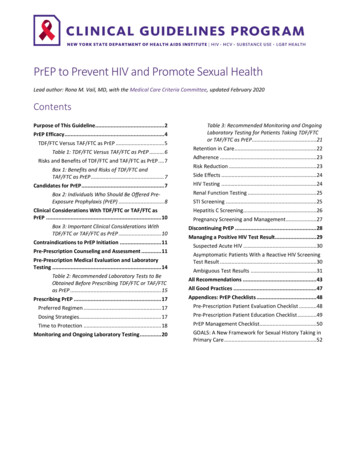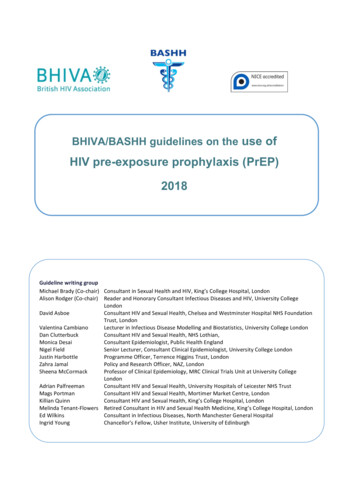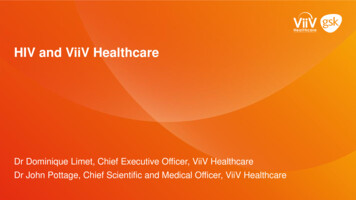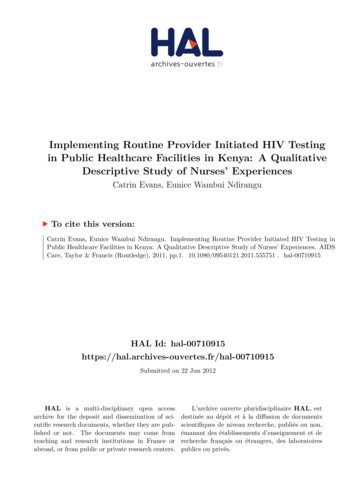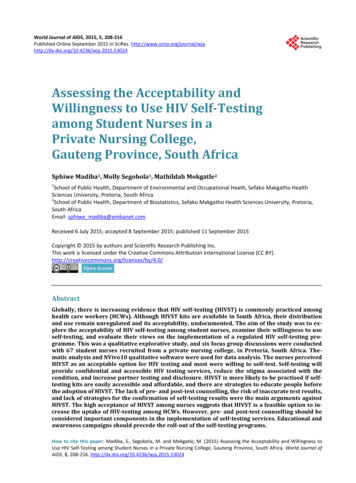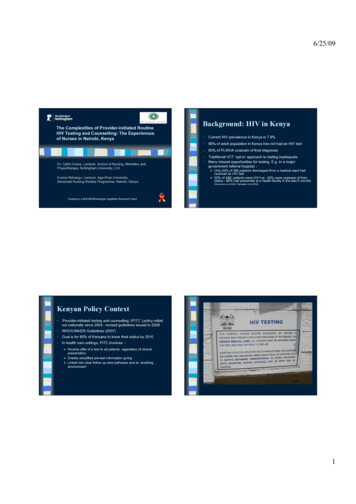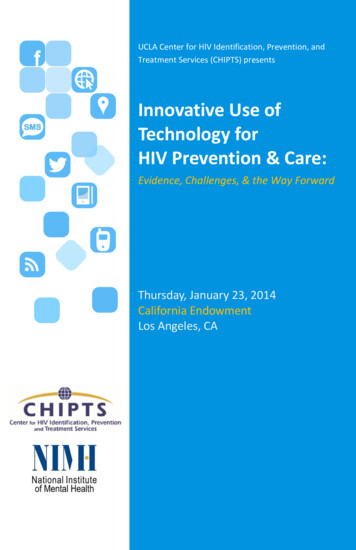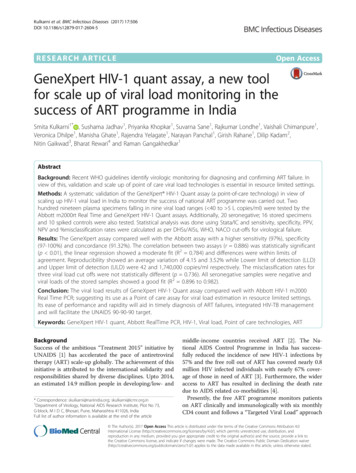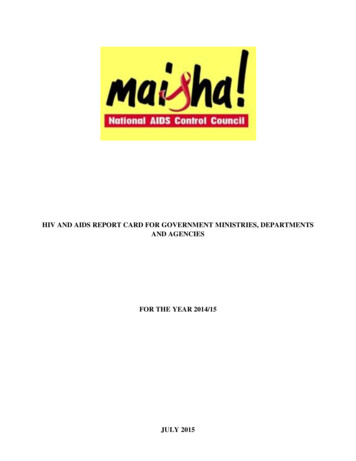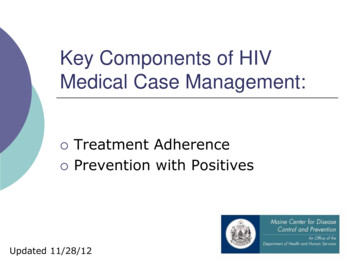
Transcription
Key Components of HIVMedical Case Management: Treatment AdherencePrevention with PositivesUpdated 11/28/121
Treatment Adherence CounselingEvery goal on the care plan must relate to HIVtreatment/care.Every case note must describe how the contact supportedthe client’s treatment adherence.This is a contractual requirement (Rider A).2
What it’s not CM: “Are you taking your meds?”Client: “Always.”CM’s case note: “Client reports100% adherence.”Scrupulously studying the client’slab work3
So, what is it? Treatment adherence is a defining characteristicof Medical Case Management, and includesactivities that increase access to and retentionin medical care: helping clients acquire and maintain healthinsurance (including MaineCare and ADAP)ensuring that clients are seeing their medicalproviders and having their labs done as often asthey shouldparticipating in the ADAP/MaineCare adherencemonitoring projectscreening for medication side effectsscreening for barriers related to seeing physicians,picking up medications, and maintaining adherenceto medications4
US Public Health Service Guidelines Patients with early stage disease should be seen bya medical provider with prescribing privileges at 3month intervals to undergo routine medicalevaluation and monitoring Visits should be more frequent when therapy isintroduced and when the CD4 T-cell count is below200CD4 T-cell count should be determined every threeto six monthsHIV-infected adults with a CD4 T-cell count below200 should receive PCP prophylaxisAntiretroviral therapy is recommended for allpatients with a history of AIDS-defining illness orsevere symptoms of HIV infection, regardless of CD4T-cell countHealth care providers may consider antiretroviraltherapy for HIV-positive women during pregnancy5
Expectations of CMs You do not need a specificmedical backgroundHowever 6
Expectations of CMs You will have a basic understanding of the major drugclasses and how they workYou will have a basic knowledge of common sideeffectsYou will be aware of optimal adherence ratesYou will have a basic understanding of commoncontraindicated over-the-counter products and becomfortable referring clients to physicians for moreinformationYou will be aware of effective adherence tools andtechniques This includes participating in the ADAP/MaineCareadherence monitoring projectYou will have skills and comfort discussing medicationsin lay terms with clients and medical providers7
Classes of Antiretroviral Meds Nucleoside/Nucleotide ReverseTranscriptase Inhibitor (NRTI)Non-nucleoside Reverse TranscriptaseInhibitors (NNRTI)Protease Inhibitors (PI)Combined Anti-retroviral ClassFusion InhibitorCCR5 AntagonistIntegrase Inhibitor8
NRTIs9
NNRTIs10
PIs11
Combined Anti-retroviral Class12
Fusion Inhibitor, CCR5 Antagonist,Integrase InhibitorFusion InhibitorCCR5AntagonistIntegrase InhibitorImages on slides 9-13 from HIV Medication Chart at http://www.crine.org/index.php?id 7513
How the Meds workFusion Inhibitorsand CCR5Antagonists workhere14
The Goals of Therapy15
Optimal adherenceOptimal adherenceis 95% or better.If you have to take two pills a day, this means you can only take threedoses late in a month’s time and still maintain the appropriate level ofadherence.16
How Adherence affects HIVFor ARVs to keep HIV under control, they must be able to recognizethe HIV virus in your blood. Otherwise the meds won’t work.Sometimes HIV mutates.Information in next five slides from Abbott Virology17
Sometimes, these mutant HIV copies are so different that the meds won’trecognize and attack them. These are the resistant HIV.18
As the resistant copies of the mutated HIV make more copies of themselves, themeds become less and less effective until a person has to switch their meds.19
Resistance to one HIV med can cause resistance to other HIV meds. This can limitwhich meds a person can take in the future.There are two blood tests that can determine if someone has become resistant to theirmeds: A phenotypic test measures how well a medicine stops the HIV in a person’sblood from making copies of itself. A genotypic test identifies which mutations the HIV has developed.20
To keep HIV from making copies of itself, a person must have enough medicinein their blood at all times. Without enough medicine, HIV will be able to makecopies, including mutant copies that may be resistant to the person’s meds.Taking meds as prescribed is one way to make sure that there is enoughmedicine in the blood.21
Side effects can affect AdherenceThe side effects of some ARVs cancause patients to stop taking theirHIV meds, sometimes withoutnotifying their doctor or againstdoctor’s advice.22
Common Side Effects Common side effects for all ARVs DiarrheaFatigueHeadacheLiver ProblemsUpset stomach, nausea, stomach pain,vomiting and poor appetite23
PI-specific side effects Lipodystrophy – change in the waythe body stores fat Patient may lose weight, especially in the arms,legs, buttocks or face (lipoatrophy)Patient may gain weight in the waist, stomach,base of the neck, or breasts (lipohyperatrophy)In rare cases, fat deposits may develop at thebase of the neck.Metabolic Problems HIV meds and HIV itself can change the level offats, sugars and insulin in the blood.This can lead to heart disease, heart attacks,stroke and diabetes.24
NRTI- & NNRTI-specific side effects Blood Problems Anemia: a decrease in the number of red cells in yourblood, which can make you feel very tiredNeutropenia and leukopenia: a decrease in thenumber of white blood cells. These cells fight bacteriaand infection and help to keep your immune systemhealthy.Thrombocytopenia: a decrease in platelets, the cellsthat make blood clot and help stop bleeding.Lactic Acidosis: when the lactic acid level in the bodybecomes too high; can lead to liver failure and death.Neuropathy: nerve problems, tingling hands and feet,numbness or burning in the fingers and toes that doesn’tgo away.Skin-related side effects: rashes, itchiness, or verydry skinThinning bones: osteoporosis or osteopenia25
Fusion Inhibitor-specific side effects Fuzeon – because it’s injected, theremight be problems at the injection siteItching Swelling Redness Pain and tenderness Hardened skin Bumps 26
If a client tells you he/she is having sideeffects Encourage your client to talk totheir doctor AS SOON ASPOSSIBLE to prevent pooradherence or unscheduledtreatment interruption.We also want to help clients havethe best quality of life possible.27
Common contraindications St. John’s Wort and othersupplementsAntacidsClients should inform their medicalprovider about ALL over-thecounter products and herbalsupplements that they are taking28
ADAP Assists clients to access theprescription medications needed to manage and treat HIVprevent and treat illnesses that developas a result of a suppressed immunesystem or are commonly associatedwith HIV (e.g. Opportunistic Infections)29
ADAP Pays deductibles and co-pays formedications on the formulary(http://go.usa.gov/PMp )Wraps around MaineCareMedicare Part DPrivate InsuranceIf client has no insurance, ADAPpays 100% for covered medications30
ADAP eligibility HIV verificationResidence in the state of MaineIncome below ADAP limit (500% FPL)Client has applied for all other eligiblehealth insurance programsCompletion of the ADAP Application andthe ADAP Release of Information31
ADAP application Client fills out the applicationDoctor or CM fills out one pageSend signed application and release pageto ADAPADAP can usually process application inone business dayApplication online athttp://go.usa.gov/PMGADAP release online athttp://go.usa.gov/PM732
Problems at the pharmacy? Clients need to show their ADAPcards at the pharmacyIf being charged co-pays orincorrect co-pays, have thepharmacist call the GHS Help Desk1-888-420-971133
Adherence monitoring project CM role: Find out why the client was late pickingup medsAre there barriers to picking up meds?Are these barriers we can address?34
Barriers Most common reasons for late pickup of meds: Have extra medicationWork-related (conflict of work hoursand schedule with pharmacy hours)Doctor and/or pharmacy issues Includes multiple pick ups of medsHealth reasons/illnesses Includes side effects35
Psycho-social barriers Lack of transportationTravelingAlcohol/Drug useLiving alone/No support systemLow literacy levelDepression/AnxietyMental Illness36
MaineCare’s ER use projectCM role: Ensure client knows proper use of EREnsure client has PCPEnsure client knows about after-hoursaccess37
Monitor review dates MaineCare waiver clients mustrecertify once per yearADAP clients must recertify everysix monthsLapses in coverage can causeserious delays in receivingappropriate care38
Sample Adherence Tools Pill boxesAlarmclocksCalendars39
Technological toolsUse service sharing in CAREWare tosee information from ADAP ADAP Formularyhttp://go.usa.gov/PMp MaineCare’s Preferred Drug List http://www.mainecarepdl.org/index.pl/pdlfiles40
REMEMBER Adherence is more than just remindingclients to take their medications. Adherence includes:Making sure clients see their doctorsregularly Making sure clients get their labs doneregularly Making sure clients have insurance – ADAP,MaineCare, Medicare, Private insurance Making sure clients have transportation toget to their appointments 41
PreventionCase Managers engage in at least one preventionsession with all clients at least once per year.This is a contractual requirement (Rider A).HRSA is now requiring all Ryan White Part Bprograms to include prevention services.42
Why prevention is important By addressing HIV prevention incare, clients can avoid: Transmission of HIV to uninfectedpartnersAcquiring STIs and other pathogens(such as hepatitis) – which areassociated with rapid diseaseprogression and increased rates of HIVtransmissionPotential reinfection or superinfection43
Expectations of CMs You will have advanced knowledge of HIVtransmission via risk behaviorsYou will have advanced knowledge of the principles,practices and techniques of risk reductionYou will be have the skills and comfort to discusssex and sexuality with clientsYou will be have the skills and comfort to discussillicit drug use with clientsYou will have a respect for and comfort with adiversity of lifestyles and personal choicesYou will be knowledgeable about key referralprograms, including Partner Services, STD services,Needle Exchanges44
Partner Services Confidential service that assistsclients to notify partners who havebeen exposed to HIV or STDs Central Maine – Lewiston STD Clinic,795-4019Northern Maine – Bangor STD Clinic,947-0700Southern Maine – Portland STD Clinic,756-8086 or 756-808445
Needle Exchange Central Maine Northern Maine Next Step Needle Exchange, 621-3785Down East AIDS Network, Ellsworth:667-3506Eastern Maine AIDS Network, Bangor:990-3626Southern Maine Portland Public Health, 874-844646
Ways to broach the subject Many of my clients find it hard to practice safer sex andsafer drug use on a day-to-day basis. The reality is thatthese are not easy things to do. I don’t know if you arehaving any trouble being safe, but if you are, I’d like tounderstand what you find difficult about it? What works foryou, and what doesn’t, when it comes to safer sex andsafer drug use?I know that practicing safer sex and safer drug use is noteasy to do every day. In fact, a lot of my clients strugglewith it. I’d like to get a sense of whether it’s a struggle foryou.There are a lot of things that can get in the way of a personbeing safe when they have sex or use drugs. What do youdo to protect yourself and your partners? What, if anything,makes it difficult to do it consistently?A lot of people find it very difficult to practice safer sexevery day. What role does safer sex play in your life? Whendo you practice safer sex? When don’t you?47
But my client isn’t having sex orinjecting drugs . Prevention services can includebasic HIV information andeducation, including conversations about commonhousehold infections (see ProjectInform brochure in your CaseManagement binder)counseling about stigma and disclosureeducation about universal precautionsand how to react to serious injuries athome or in the workplace48
that make blood clot and help stop bleeding. . pharmacist call the GHS Help Desk 1-888-420-9711 . 34 Adherence monitoring project . Use service sharing in

